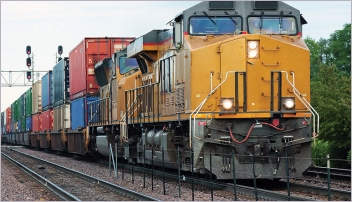Pickens points to natural gas as a boost for the trucking industry and to cut down on OPEC imports
天然气价格让每个人都不舒服,将军in, those same old fears about energy prices are back in the forefront. But it does not have to be these way. In fact, it should not be this way—period. That is how T. Boone Pickens, founder and chairman of BP Capital Management, sees it.
in the News
Let’s hear it for good inventory - on the Talking Supply Chain Podcast Preliminary Class 8 truck orders finish 2022 with declines U.S. rail carload and intermodal volumes end 2022 with declines, reports AAR NextGen Supply Chain Conference 2022: About the event Top Transportation Management System (TMS) Trends for 2023 More NewsAs diesel prices inch above the $4 per gallon mark, it is serving as a stark reminder of the dark days of 2008, when the price per barrel of oil hit nearly $150 and a gallon of diesel fuel was nearly $4.80.
Now, with prices making everyone uncomfortable, again, those same old fears about energy prices are back in the forefront. But it does not have to be these way. In fact, it should not be this way—period. That is how T. Boone Pickens, founder and chairman of BP Capital Management, sees it and he made his position on America’s dependency on foreign oil—and how to take steps to eliminate it for the greater good of the country—as clear as it gets at the Transplace Shipper Symposium in Frisco, Texas.
At the heart of his vision is Pickens Plan, which calls for building new wind generation facilities that will produce 20 percent of the country’s electricity while using domestic natural gas as a transportation fuel and for power generation. Pickens says his plan can replace more than one-third of U.S. foreign oil imports in ten years.
A one-third reduction is no small sum, especially when considering the numbers Pickens mentioned. The United States imports oil from OPEC at a cost of roughly $1 billion per day, and globally, OPEC revenues for oil purchases this year will be $1 trillion. And of that $1 trillion annual tally, the U.S. is on the hook for 25 percent of that bill on a daily basis, said Pickens.
“Out of the 20 billion barrels we use per day, we produce seven and import 13,” said Pickens. “There are 270 million vehicles in America, and we are importing 65 percent of all oil we use, with 70 percent of all the oil produced goes to transportation. Washington does not understand the problem we have here. If we go ten more years and do nothing but just import more oil, we will be importing 75 percent of all oil, with the price per gallon of diesel and oil barrels going to $300-to-$400.”
And by continuing to import large quantities of oil from OPEC, Pickens said the U.S. continues to do business with people that are not “friends of ours,” rather than take a meaningful approach to get off of oil from the Middle East.
Instead of continuing to spend large sums on imported oil, Pickens said the U.S. needs to leverage its domestic energy resources to solve the problem.
That approach is evident in legislation introduced in the House in April, H.R. 1380, New Alternative Transportation to Give Americans Solutions Act of 2011. The objective of this bill is to switch from petroleum-based fuels to natural gas for transportation, with vehicle owners, vehicle manufacturers and fueling stations to transition from gasoline and diesel to natural gas and the bill would provide approximately $5 billion in subsidies over a five year period.
“That level of funding could foot the bill for 243,000 trucks per year to switch to from diesel to natural gas with a $60,000 tax refund,” said Pickens. “This would help the President be able to say ‘I am the only President to have ever reduced imports of foreign oil.’”
Addressing the domestic supply of natural gas, which can be used to reduce U.S. dependence on foreign oil, Pickens said that the U.S. currently has 4,000 trillion gallons of natural gas—a 100-year supply—available. And other nations including China and several in Europe, are already turning to it, because it is cleaner and cheaper and abundant.
The swing from OPEC controlling transportation fuels for the last 20 years is coming to an end, but how quickly that process takes is directly up to America, as it consumes 25 percent of the entire world’s oil, said Pickens.
“The quicker we can get over to our other resources, the quicker we can get rid of the threat of our enemies selling us oil,” said Pickens. “If there is a global energy table, the U.S. does not have a seat at it. If we don’t take advantage of our natural gas resources, we are going to go down as the dumbest crowd that ever showed up.
What’s more, he explained if the 8 million Class 8 vehicles on the road today in the U.S. switched from diesel to natural gas, that would represent a reduction of 2.5 million barrels in imported oil per day and cut down on the 35 billion gallons of diesel consumed per day by the trucking industry, with a $1-$2 dollar per gallon decrease, too.

About the Author
 Jeff Berman, Group News EditorJeff Berman is Group News Editor for万博2.0app下载,Modern Materials Handling, andSupply Chain Management Review. Jeff works and lives in Cape Elizabeth, Maine, where he covers all aspects of the supply chain, logistics, freight transportation, and materials handling sectors on a daily basis.Contact Jeff Berman
Jeff Berman, Group News EditorJeff Berman is Group News Editor for万博2.0app下载,Modern Materials Handling, andSupply Chain Management Review. Jeff works and lives in Cape Elizabeth, Maine, where he covers all aspects of the supply chain, logistics, freight transportation, and materials handling sectors on a daily basis.Contact Jeff Berman

Subscribe to Logistics Management Magazine!
Subscribe today. It's FREE!Get timely insider information that you can use to better manage your entire logistics operation.
Start your FREE subscription today!
 5 Innovative Ways Manufacturers Can Optimize Their Logistics Operations
Download this new white paper to discover the five steps that manufacturers can take and partners they can work with to drive innovation and make their logistics operations more effective and efficient.
Download Today!
5 Innovative Ways Manufacturers Can Optimize Their Logistics Operations
Download this new white paper to discover the five steps that manufacturers can take and partners they can work with to drive innovation and make their logistics operations more effective and efficient.
Download Today!
 It has been a very volatile year, complicated by general political and economic instability around the globe. For logistics and supply chain professionals and carrier executives, it’s time to respond and build a coherent, cohesive, flexible and resilient strategy in the face of rapid and continuous change.
It has been a very volatile year, complicated by general political and economic instability around the globe. For logistics and supply chain professionals and carrier executives, it’s time to respond and build a coherent, cohesive, flexible and resilient strategy in the face of rapid and continuous change.Merger and Acquisition Momentum: 2022 Top 20 Warehouses Truckload: Easing back to normal? View More From this Issue
 How companies need to evolve to achieve Supply Chain Resiliency
Join our webinar, hosted by Adrian Wood from Dassault Systèmes, to learn about the key requirements and considerations in the supply chain resiliency evolution.
Register Today!
How companies need to evolve to achieve Supply Chain Resiliency
Join our webinar, hosted by Adrian Wood from Dassault Systèmes, to learn about the key requirements and considerations in the supply chain resiliency evolution.
Register Today!








